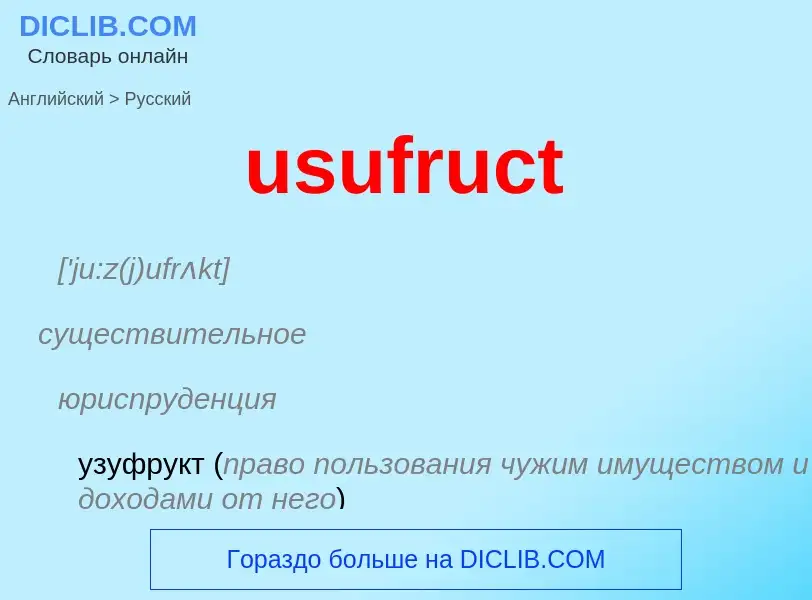Vertaling en analyse van woorden door kunstmatige intelligentie ChatGPT
Op deze pagina kunt u een gedetailleerde analyse krijgen van een woord of zin, geproduceerd met behulp van de beste kunstmatige intelligentietechnologie tot nu toe:
- hoe het woord wordt gebruikt
- gebruiksfrequentie
- het wordt vaker gebruikt in mondelinge of schriftelijke toespraken
- opties voor woordvertaling
- Gebruiksvoorbeelden (meerdere zinnen met vertaling)
- etymologie
usufruct - vertaling naar russisch
['ju:z(j)ufrʌkt]
существительное
юриспруденция
узуфрукт (право пользования чужим имуществом и доходами от него)
узуфрукт (право пользования чужой собственностью и доходами от нее без причинения ущерба)
узуфрукт (право пожизненного пользования чужим имуществом и доходами от него)
Definitie
Wikipedia
Usufruct () is a limited real right (or in rem right) found in civil-law and mixed jurisdictions that unites the two property interests of usus and fructus:
- Usus (use) is the right to use or enjoy a thing possessed, directly and without altering it.
- Fructus (fruit, in a figurative sense) is the right to derive profit from a thing possessed: for instance, by selling crops, leasing immovables or annexed movables, taxing for entry, and so on.
A usufruct is either granted in severalty or held in common ownership, as long as the property is not damaged or destroyed. The third civilian property interest is abusus (literally abuse), the right to alienate the thing possessed, either by consuming or destroying it (e.g., for profit), or by transferring it to someone else (e.g., sale, exchange, gift). Someone enjoying all three rights has full ownership.
Generally, a usufruct is a system in which a person or group of persons uses the real property (often land) of another. The "usufructuary" does not own the property, but does have an interest in it, which is sanctioned or contractually allowed by the owner. Two different systems of usufruct exist: perfect and imperfect. In a perfect usufruct, the usufructuary is entitled the use of the property but cannot substantially change it. For example, an owner of a small business may become ill and grant the right of usufruct to an individual to run their business. The usufructuary thus has the right to operate the business and gain income from it, but does not have the right to, for example, tear down the business and replace it, or to sell it. The imperfect usufruct system gives the usufructuary some ability to modify the property. For example, if a land owner grants a piece of land to a usufructuary for agricultural use, the usufructuary may have the right to not only grow crops on the land but also make improvements that would help in farming, say by building a barn. However this can be disadvantageous to the usufructuary: if a usufructuary makes material improvements – such as a building, or fixtures attached to the building, or other fixed structures – to their usufruct, they do not own the improvements, and any money spent on those improvements would belong to the original owner at the end of the usufruct.
In many usufructuary property systems, such as the traditional ejido system in Mexico, individuals or groups may only acquire the usufruct of the property, not legal ownership. A usufruct is directly equatable to a common-law life estate except that a usufruct can be granted for a term shorter than the holder's lifetime.

